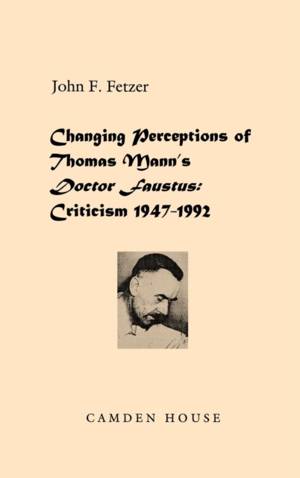
- Afhalen na 1 uur in een winkel met voorraad
- Gratis thuislevering in België vanaf € 30
- Ruim aanbod met 7 miljoen producten
- Afhalen na 1 uur in een winkel met voorraad
- Gratis thuislevering in België vanaf € 30
- Ruim aanbod met 7 miljoen producten
€ 177,45
+ 354 punten
Omschrijving
Ever since its appearance in 1947, Thomas Mann's novel Doctor Faustus has generated heated reactions among critics. Whereas initial ideological differences stemming from the Cold War and the division of Germany have abated following the reunification of 1990, diverse opinions and controversies persist about Mann's daring treatment of the Faust theme. These include such topics as the political stance of the author and the historical dimensions of the novel; the biographical and autobiographical backgrounds of the work - especially in the light of the subsequent publication of Mann's diaries and private notebooks; the writer's sexual and psychological proclivities; the thorny issues of montage, collage, and intertextuality; musical concerns such as the extent to which the novel's protagonist appropriates as his own Arnold Schönberg's twelve-tone system of composition or the role of Mann's fellow exile and mentor, Theodor W. Adorno, in indoctrinating his "pupil" into avant-garde musical techniques; the degree to which the novel exhibits structural features of the music on which the narrative focuses; and the function of certain mythic prototypes for this modern parody in fashioning the fortunes and fate of Adrian Leverkühn. A provocative and still unresolved question centers on the precise role played by Goethe's Faust
Specificaties
Betrokkenen
- Auteur(s):
- Uitgeverij:
Inhoud
- Aantal bladzijden:
- 214
- Taal:
- Engels
- Reeks:
- Reeksnummer:
- nr. 37
Eigenschappen
- Productcode (EAN):
- 9781571130709
- Verschijningsdatum:
- 4/04/1996
- Uitvoering:
- Hardcover
- Formaat:
- Genaaid
- Afmetingen:
- 169 mm x 235 mm
- Gewicht:
- 462 g

Alleen bij Standaard Boekhandel
+ 354 punten op je klantenkaart van Standaard Boekhandel
Beoordelingen
We publiceren alleen reviews die voldoen aan de voorwaarden voor reviews. Bekijk onze voorwaarden voor reviews.








